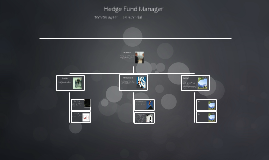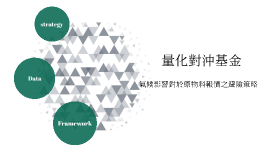Hedge Fund Strategies
Transcript: Invests in event-driven situations such as mergers, hostile takeovers, reorganizations, or leveraged buy outs. May involve simultaneous purchase of stock in companies being acquired, and the sale of stock in its acquirer, hoping to profit from the spread between the current market price and the ultimate purchase price of the company. Utilize derivatives to leverage returns and to hedge out interest rate and/or market risk. Convertible Arbitrage Managers either purchase stocks that are undervalued or sell short stocks that are overvalued The fund generally has positive exposure to the market. If 70% of the fund is invested in long positions and 30% is invested in short positions, then the fund has a net market exposure of 40% Pairs trading is a variant of long/short strategy Special Situation Purchasing a security that is expected to appreciate, while simultaneously selling short a related security that is expected to depreciate Can be used on a combination of any pair like: stock and bond of a specific company stocks of two different companies two bonds issued by the same company Event Driven Equity Market Neutral Short Selling Market Timing Relative Value Arbitrage In this strategy the net exposure of the fund to the market is zero. Can be achieved by: Equal amount of investments in long and short positions Creating a zero beta portfolio Investment approaches used by fund managers Global Macro Allocates assets among different asset classes depending on the manager’s view of the economic or market outlook. Portfolio emphasis may swing widely between asset classes. Unpredictability of market movements and the difficulty of timing entry and exit from markets adds to the volatility of this strategy. Payoffs depend on how well can the manager forecast price movements as well as the exact market timing of the movements. Taking positions in both the convertible bonds and the stocks of a company in anticipation of a price mismatch between the two securities Payoffs on convertible arbitrage are influenced by interest rate movements as well as by changes in credit spreads An important parameter in this trade is delta, the proportional change in the value of the convertible bond relative to the change in the underlying stock price This technique attempts to profit from both relative and absolute pricing inefficiencies. The market for distressed securities is often inefficient and illiquid because of factors such as investor irrationality, risk aversion, legal restrictions on holding sub par securities, low coverage by analysts, and lack of research. An active form of this strategy is to buy a substantial proportion of the outstanding security of the distressed company and then attempt to influence the restructuring process. Distressed The focus is on the securities of companies involved in mergers and takeovers Because of the possibility the merger may not go through, the target company’s share price usually carries a “bid premium”, a discount to the proposed takeover price, until the merger or takeover is finally completed. This can, however, create arbitrage opportunities Equity Long/Short Tactical Sells securities short in anticipation of being able to buy them again at a future date at a lower price Looks at various overvaluation situations of the securities, or the market, or in anticipation of earnings disappointments Investment approach is diversified by employing various strategies simultaneously to realize short-and long-term gains. Other strategies may include systems trading such as trend following and various diversified technical strategies. This style of investing allows the manager to overweight or underweight different strategies to best capitalize on current investment opportunities. Merger/Risk Arbitrage Relative Value Attempt to exploit mispricing among fixed income securities Some of the positions that can be taken are: Based on offsetting positions at various points on yield curve Based on interest rate spread between corporate bonds and treasury bonds Based on positions involving treasury bill rates and those on eurodollar market Long/Short Fixed Income Arbitrage Multi-Strategy Hedge Fund Strategies Make large bets based on forecasts of major macroeconomic events such as changes in interest rates, currency movements and stock market performance Macro funds are active in a wide variety of markets, including foreign exchange, futures, fixed income, equity, as well as both exchange-traded and over-the-counter securities The return profile of macro funds is much more volatile than that of other hedge funds. Part of the reason is that macro funds often trade in instruments that are relatively illiquid.

















